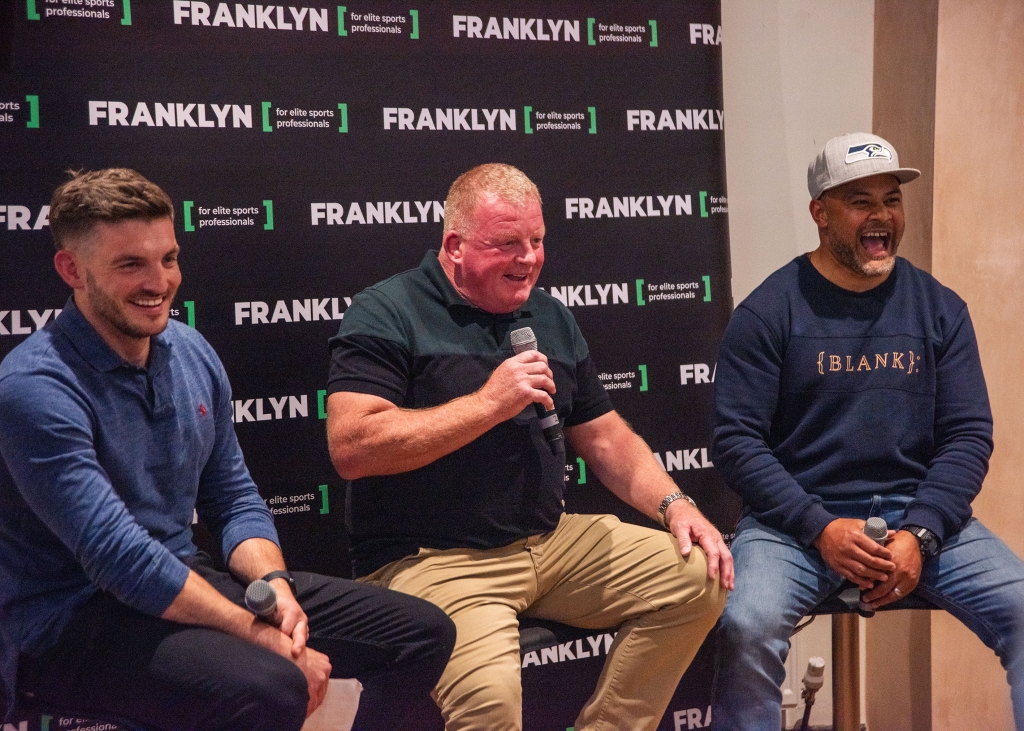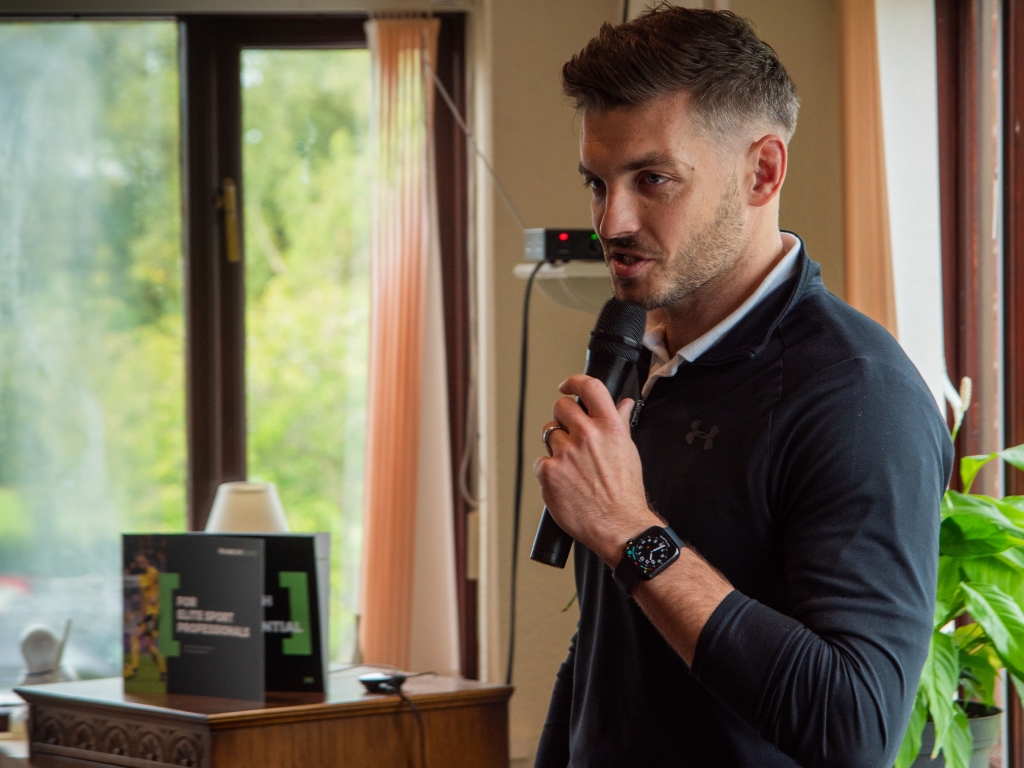After a 16-year rugby career – including 14 years as a Shark – scrum-half Will Cliff hung up his boots in the summer to take up a role heading up Franklyn’s Elite Sports division. We all miss Cliffy but with Franklyn being a proud partner of the club, he’s never too far away from Carrington.
So how has he found the transition from changing room to board room? And how has he achieved work-life balance?
It has been great so far; I’m really enjoying it.
I think it really helped that I had a 12-month cross over period whilst I was still actively playing. Conceptualising, developing, and transforming the initial idea into something significant, so then as soon as I came on board full time, I was able to hit the ground running, so I think this certainly helped.
The people I have met and the difference we have made so far, in supporting the athletes who are still in the game whether in rugby or across other sports has been really satisfying and hopefully they can see the value in the work we are doing.
We have loads going on, we are extremely busy which is brilliant, all good so far.
Now that you are working for Franklyn full time, what aspects of playing rugby have you missed the most since being away from the field?
I have definitely missed the comradery, the friendships and silly interactions with all the lads, you get elements of that in the office but when you put yourself through something like a tough rugby game or a fitness test alongside your teammates, it’s a different level of friendship.
I guess that’s with any kind of sports, you really do make friends for life, so I’ve certainly missed that.
I also miss the physical element, no one tries to run over the top of me in the office, which is weird because I didn’t think I’d miss that.
Also, I miss going to the gym, now that it’s not part of my routine I have to find time outside of my working day to do so. I took it for granted and now I miss it being a part of my routine.

In what ways has your first-hand experience as a rugby player proven beneficial in your role at Franklyn, particularly within the Elite Sports division?
I think within professional sport, although you have the coaches around you, and you have that structure around you, you have no choice but to work hard and get on with it you don’t succeed.
This means that now in my working environment I understand how to think about something, plan it, implement it and then to an extent evaluate what I have done and look at how to improve it. This mindset I got from my years of playing and it certainly crosses over into my role at Franklyn.
While at Sale, there were no big obnoxious egos, so transitioning to Franklyn has put me in a good position where I can acknowledge that I may be less experienced than a lot of people around me and I don’t have any issues about learning from those with more expertise, much like how I approached rugby. If someone excelled in certain aspects, it was natural to learn from them. I see a parallel here in my current situation.
I would say the most fascinating thing about this industry is the delayed gratification. In sports, achieving a great result and playing well at a game brings instant gratification. However, in this industry, even after a successful meeting, the outcomes may not be realised until months later. So, that took a while to get used to. There is maybe the odd quick win but certainly not to the extent of an instant rugby win.
What advice would you give to young athletes who are navigating the challenges of balancing sports and their personal life, including their finances?
You should get on board with Franklyn Elite Sports!
I think plan ahead and don’t necessarily be ashamed to ask questions or ask for help, especially from a financial point of view.
Everyone thinks you need to have a load of money before you engage with a financial advisor or to be able to benefit from the services, we provide here at Franklyn but that isn’t the case. It’s a journey at the end of the day, just like in rugby, you go through the academy and progress through to the senior team, and if you take this same approach to finances, regardless of your current position, you’ll be in a much better situation as a result. So, from a financial perspective I’d certainly say, take it seriously.
I think from an educational point of view, if you can get something in place alongside your sports career, it would be beneficial, whether that be a degree or some sort of qualification, a trade, or even just speaking to people and proactively building your network – just get stuck in and make the most of the opportunity whilst you can.
Do you have any specific goals or aspirations for the next phase of your career at Franklyn?
Short term, the goal is for me to prove the value I can add, learning and developing, all whilst making a positive impact – I think that’s my focus right now.
Then specifically focusing on the long term, this is about growing the brand awareness and as I am heading up the Elite Sports Division, I want it to be really successful. We want to be seen as the ‘go to’ for rugby professionals and then to extend the influence across other sports, as I think there is so much value we can add. Ultimately, we want to be the market leader in sporting finance for sure.
Between navigating your career at Franklyn and being the co-founder of Bach 95, how do you achieve the ideal work-life balance?
Oh Jesus, it’s not easy! If you ask me and then ask my family that same question, I think we would have 2 different answers, it’s not easy but anything worth doing is not easy.
Right now, I’m in a period of my life where I’ve got two young girls and I get to spend a lot of time with them, but I am also at a point where I need to knuckle down and work hard for my future and more importantly their future.
My diary is flexible, and I am responsible for this myself, even though it seems to get quite full.
So yes, it is a constant juggle, especially evening and weekend stuff but Franklyn is a family orientated business, and everyone at Franklyn sees the value in trying to strike that balance right.
It is very different to my old rugby schedule, this would be jam packed and tight with weekend games and training sessions. I have more flexibility now when it comes to my time.
Looking ahead, what’s on the horizon for Bach 95? Do you have any plans to expand your product range or explore new developments for the brand?
We are in a great place at the minute with Bach 95 – we have 3 really great consistent products, and I would say I’ve never been more excited going into this year, knowing we’ve got the Bach 95 lager in a great place. We also now have the alcohol-free lager, which is a really great product, at 0.0% and is exactly where we want it to be and then back end of last year, we launched the pale ale as well, so I think we’ve got 3 consistent products, which all strongly follow the brand values.
We have loads of exciting things going on, lots of new partnerships and we are just continuously growing as a brand, which is fantastic!

Are there any positive habits you’ve developed throughout your career, that have contributed to your success?
I think there is a massive amount of value in physical activity, staying healthy and incorporating this into your lifestyle. The most important thing for me is getting up in the morning, going to the gym and towards the end of my rugby career, I got into a habit of going to the sauna in terms of recovery and
I’ve maintained that habit. Sounds a bit lazy doesn’t it, going to the gym and sitting in the sauna for 20 minutes – I must add, I do workout before I go to the sauna.
I think the biggest habit is my lifestyle, because I have always been very active, I have continuously tried to keep this going.
Outside of your professional life, what activities or hobbies do you typically enjoy during the weekends?
I haven’t got time for a hobby; I wish I did!
I love sports, I always have, so I do try and get to the Sale games when they are at home which is great and through work, I spend a little bit of time watching Stoke City Football.
When I do have free time, I like playing a bit of tennis but to be honest, I just love getting outside with the dog, going for ice cream or a coffee with my girls.
Do you manage to get together with your former teammates when you have some free time?
A little bit but life gets so busy, and my old teammates have a very set schedule. I do get to meet up with them occasionally as we are doing a lot of Franklyn work with Sale at the moment, which is great!
A lot of the lads, who have retired, like me, have moved to different parts of the country or are busy with work and most of us have young families so it can be quite tricky to get together.
I think that is why the testimonial has been really good actually, it has been a great chance to see people I haven’t seen for ages and once you have an event in the diary, things tend to happen, and people seem to stick to the plan.
Extra fun questions –
1. If you were stranded on a deserted island and could only bring three items, what would they be?
I would take some sort of knife; a knife would be useful and handy.
I would probably take a speaker, so I can listen to some tunes.
Then finally, a big crate of Bach 95!!
2. What’s the most spontaneous or adventurous thing you’ve ever done?
When I was younger, end of season, we had roughly around 5 weeks off.
Me and a couple of the lads decided to get our passports and a toothbrush and head to the airport – we said we would get the cheapest flight available that day.
We managed to get a £90 flight, at midnight to Palma Nova and we ended up in Magaluf.
It was great fun!
3. Go to karaoke song?
“My Girl” by The Temptations
4. What is your ultimate cheat meal?
I do love a good pizza, a stone baked wood fired pizza.
Then I’d finish with a tub of ice cream for dessert.
5. Did you have any pre-match rituals or superstitions during your rugby career?
No, not really, I know some of the lads had a couple of superstitions, they’d put their left boot on before their right or something like that.
I guess I would do the exact same routine to prepare for a match – not so much of a ritual, just my routine really.


